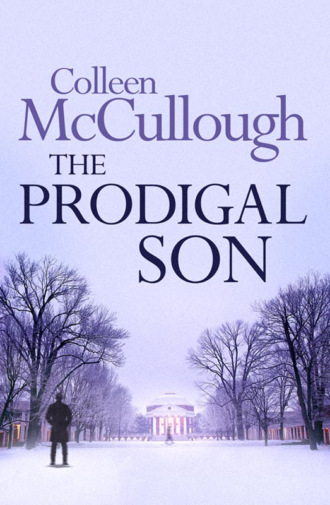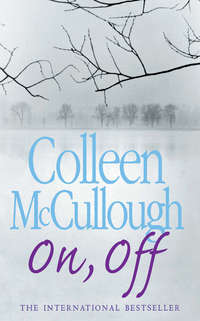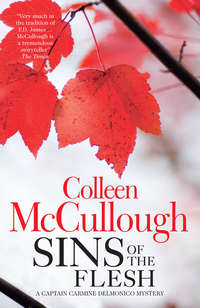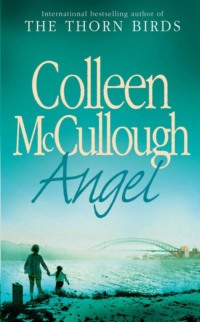
Полная версия
The Prodigal Son



For CAROLYN REIDY
the best editor I’ve ever had
a loyal and unflagging publisher
and my very dear friend
with love and thanks
Table of Contents
Title Page
Dedication
Prologue
Part One
Thursday, January 2, 1969
Friday, January 3, 1969
Saturday, January 4, 1969
Sunday, January 5, 1969
Monday, January 6, 1969
Wednesday, January 8, 1969
Part Two
Thursday, January 9, 1969
Friday, January 10, 1969
Saturday, January 11, 1969
Monday, January 13, 1969
Tuesday, January 14, 1969
Wednesday, January 15, 1969
Thursday, January 16, 1969
Friday, January 17, 1969
Part Three
Tuesday, March 4, until Friday, March 7, 1969
Wednesday, March 12, 1969
Friday, March 14, 1969
Monday, March 31, 1969
Tuesday, April 1, 1969
Wednesday, April 2, 1969
Thursday, April 3, 1969
About the Author
Also by Colleen McCullough
Copyright
About the Publisher
Prologue
Friday, January 3, 1969 from
7:30 P.M. until 11:30 P.M.
Breath surrounding him in puffed clouds, John Hall put one not-quite-steady finger on the door buzzer and pushed. The opening chords of Beethoven’s fifth symphony answered, an unexpected shock; the last thing he had associated in his mind’s eye with this unknown father and family was kitsch. Then the door was opening, a tiny little maid was divesting him of coat and gloves, and dancing at her heels came a young and beautiful woman, pushing the maid aside to attack him with outflung arms, lush lips puckered in a kiss.
“Dearest, darlingest John!” she cried, the lips squashed against his cheek because he had turned his head. “I am your stepmother, Davina.” She seized his right arm. “Come and meet us, please. Is Connecticut cold after Oregon?” she cooed.
He didn’t answer, too overwhelmed by the greeting, the young woman’s almost feverish chatter (his stepmother? But she was years younger than he was!)—and the noticeably foreign accent she owned. Davina … Yes, of course his father had spoken of her on the phone during their several conversations, but he hadn’t anticipated a bimbo, and that was how she presented. A brunette bimbo, clad in the height of fashion: a tie-dyed chiffon pantsuit in all shades of red, very dark hair loose down her back, a flawless ivory skin, full and pouting red lips, vividly blue eyes.
“It was my idea to introduce you to the family at Max’s birthday party,” she was saying, in no hurry to commence the introductions. A very few people were scattered around an ugly, hideously modern room. “Sixty!” she went gushing on in well structured English, “Isn’t that wonderful? The father of a newborn son, and the father of a long lost son! I couldn’t bear for you and Max to meet in a less significant way than tonight, everybody looking their best.”
“So this black tie is your idea?” he asked, just a trifle ungraciously.
His displeasure didn’t impinge; she laughed, her rather ropelike hair swinging as she tossed her head complacently. “Of course, John dearest. I adore men in black tie, and it gives us women an excuse to dress up.”
At least her prattle—there was more of it—had enabled him to assimilate those present, even come to some conclusions. Three tall, robustly built men stood together, and were very obviously related; John could say with certainty that they were his father, his uncle and his first cousin: Max, Val and Ivan Tunbull. Their broad Slavic faces were set in lines speaking of undoubted success, their well opened yellowish eyes held confidence and competence, and their thick, waving thatches of brassy hair said that baldness did not run in the family. The Tunbull family … His family, whom he wouldn’t have known before tonight had they chanced to encounter each other at a different black tie dinner party …
A briskly professional looking man of about forty was standing with them, his very pregnant wife of around his own age beaming up at him fatuously: not a bimbo!
Where were Jim and Millie Hunter? They’d said they would be here! Surely no one could be later than he? It had taken almost an hour for him to get up the courage to ring that bell, striding up and down, smoking cigarettes, shrinking back into the shadows when the professional guy and his pregnant wife came across the street, engaged in what sounded like married couple banter. No, maybe not an hour, but a half hour, sure.
Came another dose of Beethoven in tinny bells; the tiny servant moved to the front door, and in they came, Millie and Jim Hunter. Oh, thank all the gods! Now he could meet his father with a confidence bolstered by knowing that Jim Hunter had his back. How much he had yearned for this reunion!
Max Tunbull was advancing toward him, hands outstretched. “John!” said Max in a gravelly voice, taking John’s right hand in both his, smiling on a wall of huge white teeth, then leaning in to embrace him, kiss his cheeks. “John!” The yellow eyes filled with tears. “Oh, Jesus, you’re so like Martita!”
When the fuss died down, when all the introductions were safely in the past, when John felt that he could make some choices of his own without his stepmother foiling him, he sought out Jim and Millie, havens in a stormy, unknown sea.
“I was about to head for the hills when you came in,” he confessed, more to Jim than to Millie. “Isn’t this weird?”
“Three women, six men, and black tie. You’re right, it is weird,” Jim said, but not sounding puzzled. “Typical for Davina, though. She loves to be surrounded by men.”
“Why am I not surprised?” John put his martini glass down with a grimace.
“You no like?” asked a voice at his elbow.
He turned to look, found the midget maid. “I’d much rather have a Budweiser,” he said.
“I get.”
“One for me as well!” called Jim to her back. “Have you managed to talk to your dad yet?”
“Nope. Maybe at the dinner table. It’s as if his bimbo wife doesn’t want to give me any opportunity.”
“Well, she can’t keep that up forever, especially now you’re in Holloman,” Millie comforted. “Vina has to be the center of attention, from the little I’ve seen of her. Jim knows her far better.”
“Thanks for being home last night when I blew in from Portland,” John said. “I couldn’t wait to see you.”
“I can’t believe Max let you stay in a hotel,” Jim said.
“No, that’s my fault. I figured I’d better have some place of my own to retreat to if I needed, and right about now I’m glad. California or Oregon this ain’t.”
“Hey, California was a long time ago,” Jim said gruffly.
“It lives in my heart like yesterday.”
“This is more important, John,” Millie said. “Family is all-important.”
“With an ugly stepmother in control? All that’s missing are the ugly stepsisters. Or should that be stepbrothers?”
Millie giggled. “I see the analogy as far as Davina goes, John, but you’d make a lousy Cinderella. Anyway, it’s a role reversal. You’re not an impoverished kitchen slave, you’re a millionaire forestry tycoon.”
When Davina drove them to the dinner table, a wide one as well as long, John found that he and Max were seated together at the head of the table; Davina occupied the foot alone. Down the left side she put, from Max to her, Ivan Tunbull, Millie Hunter and Dr. Al Markoff. On the right side she seated, from John to her, Val Tunbull, Muse Markoff the pregnant wife, and Jim Hunter.
And at last John had a chance to talk to Max Tunbull, who turned a little side on and asked, “Do you remember your mother at all, John?”
“Sometimes I think I do, sir, at other times I’m convinced that what I think I remember is an illusion,” John said, his eyes suddenly more grey than blue. “I see a thin, sad woman who used to spend her time typing. According to Wendover Hall, who adopted me, she was very poor, made a living from typing manuscript for a dollar a page, no errors. That’s how he met her. Someone recommended her to type a book he’d written on forestry. It wasn’t long before he put her and me in a beautiful house at Gold Beach in Oregon. She died six months later. That I do remember! I must have been with her when she died, and I wouldn’t leave the body. Kinda like a dog, I guess. She’d been dead for two days when Wendover found us.”
Max blinked his own tears away. “My poor boy!”
“My turn to ask a question,” John said, voice hard, curt. “What was my mother like?”
Closing his eyes, Max leaned back in his chair slightly, as if speaking of his first wife didn’t come easily—as if, indeed, he endeavored never to think of her. “Martita was what these days we’d call a depressive, son. Back in the 1930s, the doctors said she was neurasthenic. Quiet and withdrawn, but as lovely on the inside as she was on the outside. My family didn’t like her, especially Emily—Val’s wife, in case you’re not keeping the names straight yet. I never realized how badly Em got under Martita’s skin until after she left, taking you with her. That was June of 1937, and you were barely a year old. Of course it all came out afterward, while I was scouring the country looking for you and your mom. Em worked on your mom’s insecurities every chance she had to be alone with her—relentless, unbelievably cruel! Convinced her she wasn’t loved or wanted.” The reddish-tan lips thinned. “Emily was punished, but too late for Martita.”
“She’s not here tonight—was she expelled from the family?” John asked uncomfortably.
Max gave a short, harsh laugh. “No! That’s not how most families work, John. Em just got the cold shoulder from the rest of us, including Val. Even Ivan wasn’t encouraged to take her side in anything—and he didn’t, either.”
“So that’s why Emily’s not here tonight?”
“Not really,” said Max nonchalantly. “Em’s grown in her own direction, which suits the rest of us just fine.”
“She won’t like my advent. It must look to her as if I’m going to reduce her son’s share of the family business.”
Max looked into this long lost son’s face with what seemed genuine love. “On that head, John, I can’t thank you enough. It came hard to Ivan to lose half his inheritance to my son Alexis, so to know you’re making no claim on me is wonderful.”
“I have so much money I’ll never be able to spend it,” John said, searching his father’s face. “Ivan can rest easy. I hope you’ve told him that?”
“No chance yet, but I will.”
Someone was banging a spoon against an empty crystal wine glass: Davina.
“Family and friends,” Davina began, each word carefully articulated, “we are gathered here tonight to kill the fatted calf for my darling husband’s prodigal son, lost to him for over thirty years. However, we also kill the fatted calf to honor my beloved Max, who turned sixty three days ago.”
She paused, eyes roaming the attentive faces. “We know why Emily isn’t here, but, dearest John, the absence of Ivan’s wife is equally habitual—Lily says she’s just too shy to face a room that might contain a stranger. Silly girl!”
Startled, John’s gaze flew to Ivan, who was glaring at his step-aunt in furious dislike, and John for one couldn’t blame him. What an awful thing to say! Max must really be under the thumb of this—no, not bimbo. Davina was a harpy, she ate people tooth and claw, slavering.
“On October thirteenth of last year,” the high voice went on, “I gave birth to Alexis. A son for Max at last, an heir to replace his beloved John.” She smiled at Max brilliantly. “And then, a month ago, John phoned from Oregon. He had found out who his family were, and he wanted to return to the fold.”
She emitted a histrionic sigh. “Naturally Max doubted John’s identity, but as the calls went on and the documents were produced in various lawyers’ offices, Max began to hope. And after the ring arrived, who could continue to doubt? Not my beloved Max! John the prodigal son had returned from the dead. So now we gather to celebrate the reunion of Max and John Tunbull. Lift your glasses and be upstanding!”
My name is John Hall, Davina, thought John to himself at the end of this disingenuous, mischievous speech. Not John Tunbull! Now I have to sit here while these people toast us. Prodigal son, for God’s sake! She never quite gets the story right, this eastern European harpy.
Embarrassed to look at any of those faces, his eyes went to the diminutive woman who appeared to be some kind of superior servant, moving among the hired help in smooth command. Clad in a shapeless grey dress with a shapeless body underneath, it was hard to arrive at her status in this menagerie. Her face was flat and suggested a cretin, as did the flat-backed skull, but the black, currantlike eyes were intelligent and the tiny, short-fingered hands deft as she wiped a dribbled speck of food from one plate and rejected another as unfit to be served. He had heard various people call her Uda; from what little he had seen thus far, John decided that she was Davina’s personal servant owning no allegiance to the Tunbulls. Just who was Davina Tunbull?
The meal was fantastic. Iranian caviar and trimmings was followed by the closest Davina could get to a fatted calf, she explained: roast milk-fed veal, lean, pink and juicy, with perfectly cooked vegetables, and an amazing cake for dessert. John ate well—he couldn’t resist such delicious fare.
As they rose from the table Davina sprang another surprise with another crystalline tattoo on a glass.
“Gentlemen, to Max’s study for coffee, after-dinner drinks and cigars!” she cried. “Ladies, to the drawing room!”
And finally, in a kind of foyer that ran between the dining room and Max’s study, John managed to waylay Jim Hunter.
“Do you believe this?” he asked, moving to one side of the traffic flow, six men fleeing from that awful woman.
Jim rolled his eyes, an almost scary expanse of stark white in such a black face. “It’s typical Davina,” he said. “I know the Tunbulls well after this past year and more putting A Helical God to press. But we’ll have plenty of time for me to tell you about that now that you’re in Holloman.”
“It was terrific to reminisce last night when I found you at home,” John said. His eyes, returned to blue, rested fondly on Jim’s face. “You look great, Jim. No one would ever recognize you for the old Gorilla Hunter.”
“For which I have you to thank. I can pay you back for my operation at last, old friend.”
“Don’t even try!” John frowned. “Millie’s still too thin.”
“That’s her nature, she’s an ectomorph.” The big, luminous green eyes, so strange in Jim Hunter’s darkness, swam with tears. “God, it is good to see you! Over six years!”
John hugged him hard, a strong yet manly embrace that Jim returned, then, emerging, saw Dr. Al Markoff glancing at his watch.
“Another hour, and I’ll be able to grab my wife and split. Davina’s hard to take tonight,” Markoff said, leading the way. “Long lost sons crawling out of the woodwork aren’t in her line, no offense, John, but the forestry background makes it an ideal metaphor.” He glanced at his watch again. “Not bad, not bad. It’s just ten-thirty. Muse and I will be sawing wood in less than an hour, ha ha ha. Punsters can’t help themselves, John.”
A little to John’s surprise (though his ego wasn’t bruised), Max put Jim Hunter in what was clearly the place of honor in his den: a big, padded, crimson leather wing chair. The whole room was crimson leather, gilt-adorned books, walnut furniture and leaded windows. Artificial. Davina, he would have been prepared to bet.
He drew up a straight chair in front of but to one side of Jim’s wing chair, hardly curious about Jim’s significance: it would all come out in time, and he had loads of time. Max had gone into a huddle with Val and Ivan, each flourishing a large cigar and a snifter of X-O cognac; the Tunbulls don’t skimp on life’s little niceties, he thought, and they love to huddle. Dr. Al drew up another straight chair on Jim’s other side, and the den settled into two separate conversations.
“Are you the Tunbull family physician, Al?” John asked.
“Lord, no! I’m a pathologist specializing in hematology,” Markoff said affably, “which won’t mean any more to you than Douglas fir does to me. Now Jim’s RNA I find fascinating.”
“Is this yours and Muse’s first child?” he pressed.
Markoff guffawed. “I wish! This, my bachelor friend, is the forties accident. We have two boys in their teens, but Muse is too scatty to throw geniuses, so they’re horribly ordinary.”
“I think you’d be a pretty cool father,” John said, enjoying the man’s easygoing humor as he expanded on the theme of the accidental forties pregnancy; while he talked, John almost forgot what he suspected was going on between Max, Val and Ivan: the non-depletion of Ivan’s share of the family business and estate.
He felt suddenly very tired. The meal had been long and his wine glass refilled too often, something he disliked. To gird up his loins for this meeting had taken courage, for there was much of his mother in John Hall, who shrank from confrontations. After Jim and Dr. Al moved on to nucleic acids, John managed a surreptitious peek at his watch: 11 p.m. They had been in the den for a half hour, which meant, according to Dr. Al, another half hour to go before he stood any chance of escaping. Max was gazing across at him with real love and concern, but how could he get to first base with a father shackled to a harpy like Davina? She would be rooting for baby Alexis, and why not?
Sweat was stinging his eyes; funny, he hadn’t noticed until now how hot the room was. Rather clumsily he groped in his trousers side pocket for his handkerchief, found it, yet couldn’t seem to pull it out.
“Hot,” he mumbled, running a finger around the inside of his collar. The handkerchief finally came free; he held it to his brow and mopped. “Anyone else hot?” he asked.
“Some,” said Jim, taking John’s brandy snifter from him. “It’s the end of the evening, why not take off your tie? No one will mind, I’m sure.”
“Of course take it off, John,” said Max, moving to the dial of the thermostat; the response of cooler air was immediate.
His lips felt numb; he licked at them. “Numb,” he said.
Jim had taken the tie off, loosened the collar. “Better?”
“Not—really,” he managed.
He couldn’t seem to draw air into his lungs properly, and gasped. Sweet cool air flooded in; he gasped again, but this time it was harder to suck in a breath. He swayed on the chair.
“Get him on the floor, guys,” he heard Dr. Al say, then felt himself laid supine, a loosely rolled coat behind his head. Markoff was ripping open the buttons on his shirt and barking at someone: “Call an ambulance—resuscitation emergency. Max, tell Muse to give you my bag.”
Nauseated, he retched, tried to vomit, but nothing came up, and now he just felt sick, didn’t have the strength to retch. His teeth chattered, he was appalled to find his whole body invaded by a fine tremor. Then came an almighty, convulsive jerk, as if it were happening to someone else—why was he so aware of everything that was going on? Not in a disembodied way—that he could have borne, to hover looking down on himself. But still to be inside himself going through it was awful!
All that became as nothing compared to his struggle to breathe, an ever-increasing impossibility that flung him into a terror he had no way to show beyond the look in his eyes. I am dying, but I can’t tell them! They don’t know, they’ll let me die! I need air, I need air! Air! Air!
“Heartbeat’s weak rather than suspiciously irregular, it isn’t a primary cardiac catastrophe,” Dr. Al was saying, “but his airway is still patent. Shouldn’t have this gear with me, except that I borrowed it for a refresher course in emergency medicine … Gotta keep up with the times … I’ll intubate and bag breathe.”
And while he talked he worked, one of those odd people who like to do both simultaneously. With the first puff of oxygen into his lungs, John knew through his mania that he could not have had a better man treating him if it had gone down in the ER itself. For perhaps six or seven blissful breaths he thought he’d beaten whatever it was, but then the gas bag and the strong pressure on it couldn’t force his air passages to inflate, even passively.
Inside his head he was screaming, screaming, screaming a blind, utter panic. No thoughts of the life he had lived or any life to come intruded for as long as the width of a photon; no heaven, no hell, just the horrifying presence of imminent death, and he so alive, awake, forced to endure to the last, bitterest … In his eyes an electrified terror, in his mind a scream.
John Hall died eleven minutes after he started feeling hot. Dr. Al Markoff knelt to one side of him fighting to keep him alive, Dr. Jim Hunter knelt to his other side holding his hand for comfort. But life was gone, and of comfort there was none.
PART ONE
From
THURSDAY, JANUARY 2, 1969
until
WEDNESDAY, JANUARY 8, 1969
THURSDAY, JANUARY 2, 1969
“Daddy, what’s the procedure when I’m missing a toxin?”
Patrick O’Donnell’s startled blue eyes flew to his daughter’s face, expecting to see it laughing at having successfully pulled Daddy’s leg. But it was frowning, troubled. He gave her a mug of coffee. “It depends, honey,” he said calmly. “What toxin?”
“A really nasty one—tetrodotoxin.”
Holloman County’s Medical Examiner looked blank. “You’ll have to be more specific, Millie. I’ve never heard of it.”
“It’s a neurotoxin that blocks nerve transmission by acting on the pores of the voltage-gated, fast sodium channels of the cell membrane—or, in simpler words, it shuts the nervous system down. Very nasty! That’s what makes it so interesting experimentally, though I’m not interested in it per se. I use it as a tool.” Her blue eyes, so like his, gazed at him imploringly.
“Where did you get it from, Millie?”
“I isolated it myself from its source—the blowfish. Such a cute little critter! Looks like a puppy you’d just love to hug to death. But don’t eat it, especially its liver.” She was perking up, sipping the coffee with enjoyment now. “How do you manage to make a good brew in this godawful building? Carmine’s coffee sucks.”
“I pay for it myself and severely limit those invited to drink it. Okay, you’ve jogged my memory cells. I have heard of tetrodotoxin, but only in papers, and in passing. So you actually isolated it yourself?”
“Yes.” She stopped again.
“I’ll do a Carmine: expatiate.”
“Well, I had a tank of blowfish, and it seemed a shame to waste all those livers and other rich bits, so I kept on going and wound up with about a gram of it. If taken by mouth, enough to kill ten heavyweight boxers. When I finished my experimental run I sealed the six hundred milligrams I had left over in glass ampoules, one hundred milligrams to each, slapped a poison sticker on the beaker holding the six ampoules, and put it in the back of my refrigerator with the three-molar KC1 and stuff,” said Millie.







